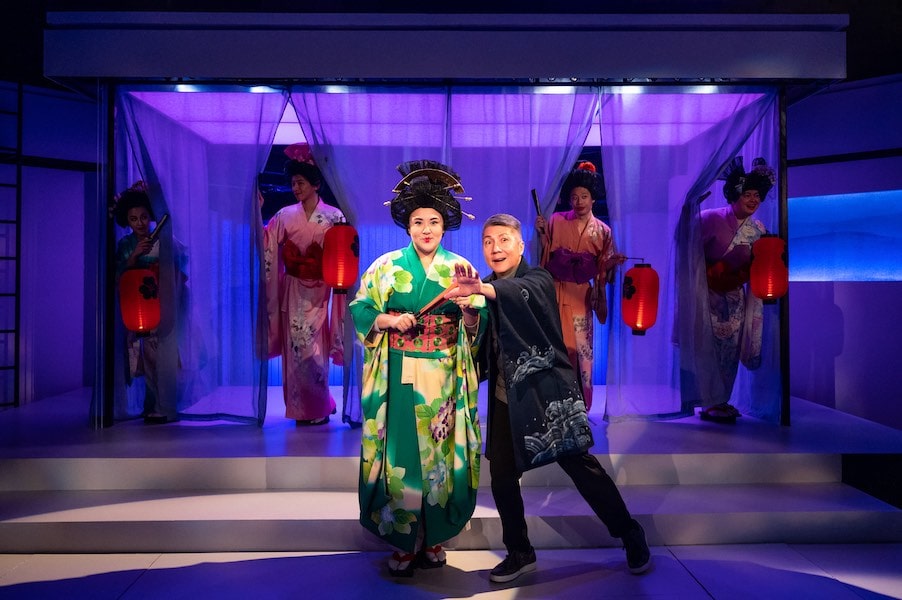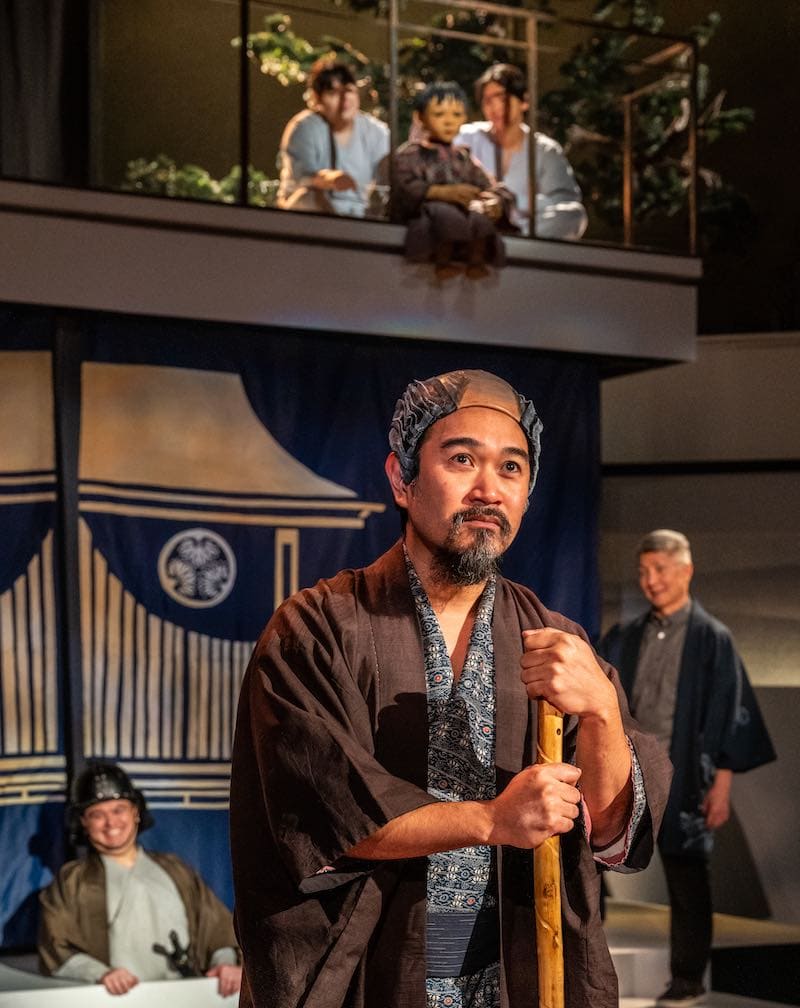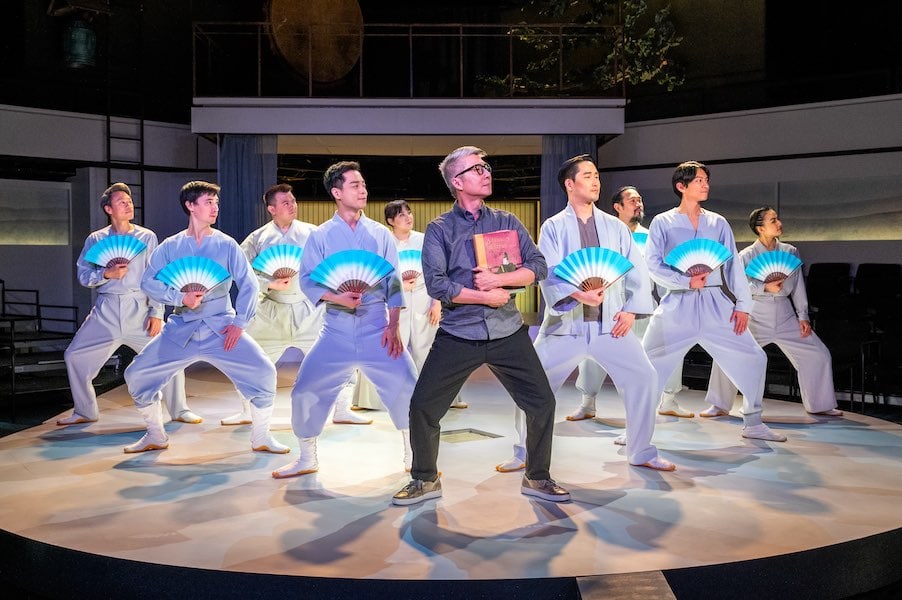Stephen Sondheim once wrote a song titled “I Never Do Anything Twice.” It wasn’t about his career, but it might have been. The subject matter of each of his shows is distinct and singular, and the infrequently mounted Pacific Overtures, now presented in a polished and innovative production by Signature Theatre, may be the most strikingly unique of them all.
Set in mid-19th-century Japan, Pacific Overtures depicts, from the point of view of the Japanese, the rapid social and political change following an expedition by a U.S. naval squadron that demanded, at cannon point, commercial and diplomatic relations between Japan and the West.

The first act focuses on the gunboat diplomacy itself. Jason Ma, as the “Reciter,” describes isolationist Japan, which, under the Tokugawa Shogunate, maintained domestic tranquility for 250 years as an island floating in the middle of the sea, untouched by “things … being done somewhere out there.” In Chika Simizu’s elegantly simple scenic design, the white turntable-centered set becomes that island, while blue panels suggesting the ocean surround the entire theater space.
Unlike his counterpart in the original 1976 production, which I had the privilege of seeing during its run in Washington, Ma’s Reciter is not a highly formal figure, often anchored to his seat, speaking in a stylized way derived from kabuki practice. He is relatively conversational in tone, moving about the stage. Director Ethan Heard’s approach to the production in general appeared to aim for accessibility, in a show whose original kabuki-based concept, along with its proscenium structure, kept audiences at a greater emotional distance.
On the approach of the American ships, the Reciter and townspeople liken them to “Four Black Dragons.” Here, multiple actors in the versatile 10-member cast represent the collective emotional impact of an event that amazes an entire people. The impact is felt particularly in the lives of two men: Manjiro (Jonny Lee Jr.), a fisherman who had spent years in the U.S. after being rescued at sea, and Kayama (Daniel May), a minor samurai who is assigned to meet the Americans, since higher-level officials disdain the task.
They begin as allies, trading brief poems (a lovely example of Sondheim’s maxim “less is more”) and tossing an orange between them, often walking counter to the direction of the turntable’s rotation, effectively conveying the sense of their long journey. They contrive a subtle plan to permit the American and Japanese officials to meet in a temporary “treaty house” without the former literally setting foot on Japanese soil.
Meanwhile, some fissures appear in the seemingly smooth surface of Shogunate politics. The loyalty of the “lords of the South” (i.e., the Satsuma and Choshu domains in southwestern Japan) is in question. The feckless Shogun (also played by Ma) dithers in the face of the American flotilla. In “Chrysanthemum Tea,” a delightfully plotted little four-act puzzle play, his formidable mother (Andrew Cristi) takes decisive action, simultaneously humorous and insidiously chilling.
In “Welcome to Kanagawa,” politics and diplomacy take a brief timeout while a local madam (Chani Wereley) instructs her charges in the techniques to use with visiting American sailors. In his book Finishing the Hat, Sondheim calls this number “the most annoyingly problematic song I’ve ever written.” While it provides a moment of light entertainment, it fails — through no fault of the performers — to add much to the show.
At the center of Pacific Overtures is “Someone in a Tree,” one of Sondheim’s favorite lyrics, as the program points out. Long after the event, an old man (Eymard Meneses Cabling) recalls himself, as a boy, climbing a tree above the treaty house and seeing, but not hearing, the comings and goings of the participants. Meanwhile, a warrior (Christopher Mueller), secreted under the floorboards, hears sounds but can see nothing. It’s an inventive way of addressing an event of which there are no detailed historical records.

The tree and the boy (Albert Hsueh) are stationed on a platform well above the stage, while the old man remains on the main playing surface. The physical distance between the old man and the boy loses some of the original production’s intimacy between his younger and older selves, and consequently some of the number’s poignance.
When the Americans (and later, Europeans) appear, they are portrayed as caricatures, with garish uniforms and large-nosed masks. In the original version of the show, the American leader, Commodore Perry, concludes the first act with a spectacular kabuki lion dance. In this production, Perry (Nicholas Yenson) only stomps briefly around the stage, in my view a missed opportunity.
The second act begins with more satire of Western pretension, as American, British, French, Russian, and Dutch admirals present their demands to the Japanese. Each is given a stereotypical musical style (e.g., Gilbert and Sullivan–style patter for the British official — the events of the play take place before Gilbert and Sullivan wrote any operettas, but Sondheim, never a G&S fan, can be forgiven for a small anachronism).
Heard’s staging of “A Bowler Hat” is a highlight of the production. Kayama and Manjiro — the former becoming progressively more westernized, the latter becoming ever more deeply invested in samurai tradition — sit opposite each other, while the turntable spins slowly as years pass and friends become enemies. Subsequently, the lords of the South make a presentation to the boy emperor (represented by a puppet), told as a fable about a courageous king and a tiger. The tale is visualized in a movement piece, brilliantly executed by Yenson.

One of the important features of the set is a rectangular area set apart by a diaphanous blue curtain. It’s used effectively throughout, one example being slow-motion sword practice between two samurai, who spring into action when three British sailors threaten a Japanese girl (a well-manipulated puppet) in “Pretty Lady.”
Revolution is afoot, and in a riveting sword combat sequence (Yoshi Amao is the fight director), the old order is overthrown and the Emperor (now portrayed by Ma in a Western-style uniform) emerges as the center of power, decreeing that Japan will take on the West on Japan’s own terms, in what has come to be known as the “Meiji Restoration.”
The first part of the final number, “Next” focuses on Japan’s rapid militarization, leading to the disaster of World War II (in historical fairness, economic, industrial, legal, and educational modernization were part of the package as well). In 1976, when Japan was thought in the U.S. to be a threatening economic juggernaut, the remainder of the number highlighted the success of Japan’s auto and technology industries. In Signature’s updated version, a darker picture — an aging population, climate change — receives the attention.
As one expects from Signature, all the technical aspects of the show — lighting (Oliver Wason), sound (Eric Norris), the varied and colorful costumes (Helen Q. Huang, also responsible for the puppets) — are top-notch. Deserving special recognition is Mark H. Rooney, whose huge booming drum, set on the platform above the stage, is often a dominating presence setting the tone for scenes.
Pacific Overtures may be a show that is easier to admire than love. But in this gorgeously detailed production, the admiration is well-earned, and each moment justifies the audience’s interest and engagement.
Running Time: Approximately two hours and 20 minutes, including one intermission.
Pacific Overtures plays through April 9, 2023, in the MAX Theatre at Signature Theatre, 4200 Campbell Avenue, Arlington, VA. For tickets ($56–$103), call (703) 820-9771 or purchase online. Information about ticket discounts is available here.
The program for Pacific Overtures is online here.
Closed captions are available via the GalaPro app.
COVID Safety: Masks are always optional but strongly encouraged in the lobby and other public areas of the building. Face masks are required inside the performance spaces on Thursdays and Sundays. Face masks are optional but strongly encouraged inside the performance spaces on Tuesdays, Wednesdays, Fridays, and Saturdays. Signature’s COVID Safety Measures can be found here.




